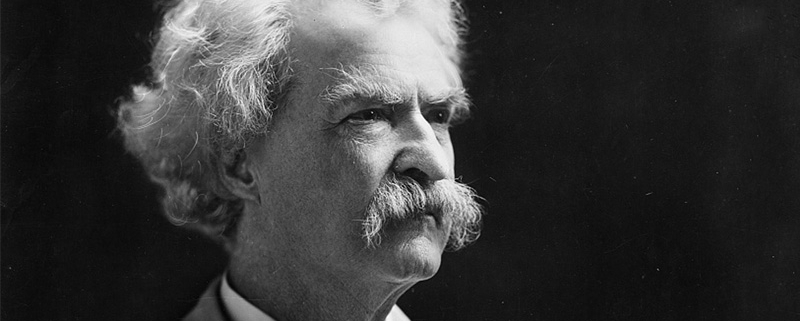Chaplain’s Corner: XVI
“Seeing With the Eyes of Jesus”
Who’s the greatest hero in American literature? Author and scholar Elliot Engel believes we shouldn’t be surprised to discover it’s a black slave. But what should amaze us is that this heroic character was invented by a white Southerner in 1885–just 20 years after the end of The Civil War.
The Southerner whose parents were from Virginia and Kentucky was Mark Twain. The character from “The Adventures of Huckleberry Finn” is named Jim. Twain is widely regarded as the father of two American literary innovations. First characters in Twain’s novels actually talked like real Americans complete with twangs, ain’ts and y’alls- instead of sounding like stuffy Londoners. Second, his books were actually funny. It’s hard to believe, but for about 250 years from 1620-1870 “serious literature” in our country meant the reader should never encounter a reason to crack a smile.
“Huckleberry Finn” is the story of two runaways: Jim, the fugitive slave and his friend Huck, the white son of an alcoholic father who had attempted to kill him.
It landed on the American literary scene with a thud. Nobody bought the book. People spread the word that it was loathsome. Louisa May Alcott of Massachusetts, famous for her book “Little Women”, was basically the Oprah Winfrey of her day. If she read a book everyone had to have it. Alcott got through about half of “Huckleberry Finn” before deciding she couldn’t bear another word. She wrote what became an infamous letter to the author:
“Dear Mr. Twain, I have tried to read your novel, The Adventures of Huckleberry Finn, but I find the characters and incidents in this book so common, so vulgar, and so dirty that I say to you Mr. Twain, that if you can’t write a book better for our young people better than Huckleberry Finn you should not write in the future.”
This was not the kind of publicity Twain had been hoping for. But Lisa May Alcott didn’t stop there. She spearheaded legislation in her home state that banned the book because of its “dirty incidents.”
Twain promptly took out ads across the country in which he proclaimed that his latest book had been banned in Massachusetts “for all of its dirty incidents.” Sales immediately skyrocketed. People couldn’t wait to read what made Louisa Mae so anxious. Readers never found any dirty incidents, because there weren’t any. But they did discover the uplifting story of a young boy with a tender conscience, one who was told that he was risking going to hell with his friend Jim.
The novel ultimately became so famous Twain was a celebrity for the rest of his life. As Engel wrote, he occasionally received notes like this one:
“Dear Mr. Twain, I liked your book, but did you realize that you made the hero of the book the most kind, decent, loving person in your novel–the black slave, Jim? You can’t make a former black slave the hero of a novel! What do blacks have to do with good society?”
Twain always gave the same answer: “The reason I made the black slave Jim the greatest character in Huckleberry Finn is because since blacks are not taken into good society, they are the only persons in this country who have not been warped and ruined by the good society of which they are not a part.” Then he added: “Because blacks aren’t good enough to be taken into good society, they have to be foolish enough to live by the dictates of Jesus Christ in the Sermon on the Mount. They foolishly think that the last shall one day be the first. And because they are so ill treated by white society today, not only must they survive by any means they can, but they survive today with a dignity that most white people cannot imagine.”
This summer we find ourselves in the midst of our nation’s ongoing struggle to determine whose lives really matter and why.
Mark Twain voiced his convictions 135 years ago: “Those who are seeking great character, great hearts and great lives will be served if they are utterly colorblind.”
Faithfully,
Ron Naylor, Chaplain




